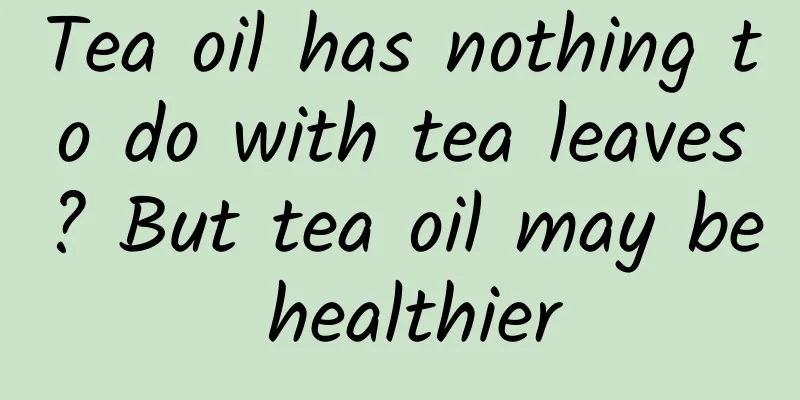Tea oil has nothing to do with tea leaves? But tea oil may be healthier

|
In nature, many plants are used by humans for their unique properties. Among the many plant oils, tea oil is highly regarded for its unique nutritional value and health benefits. However, due to the similarity in the name, many people may mistakenly believe that tea oil is directly related to the tea we drink daily. This misunderstanding stems not only from the similarity in the name, but also because both are derived from the same genus of plants - Camellia. But in fact, tea oil and tea leaves are essentially different in botanical classification, growth environment, extraction process, and application of the final product. Tea Tree Tea oil, as an ancient edible oil, has a cultivation history of more than 2,000 years in my country, and its history can be traced back to the Han Dynasty in China. Tea oil is an edible vegetable oil extracted from the mature seeds of the common tea plant of the genus Camellia in the Theaceae family. Tea oil is an important woody oil tree species in my country, with unique advantages and development potential that do not compete with farmers for land or food. Making full use of barren hills and wastelands to plant tea oil and strengthening the transformation of existing low-yield and low-efficiency tea oil forests can effectively alleviate the contradiction between oil supply and demand and import pressure, and enhance my country's food security capabilities. With the joint efforts of the state and various regions, my country's tea oil has formed a large-scale industry with an output value of 70 million mu and more than 100 billion yuan. According to the plan, it is expected that by 2025, the national tea oil planting area and tea oil production will reach 90 million mu and 2 million tons respectively. As one of the four major oil crops in my country, tea oil production accounts for about 90% of woody edible oil plant oils, and occupies an important share in the composition of edible oil for the Chinese people. It is expected that the proportion will reach 8% after 2035. Camellia oleifera forest Tea oil is also known as the "Oriental olive oil" and is a natural and healthy cooking oil. Its health benefits are mainly attributed to its unique nutritional ingredients. Tea oil is rich in unsaturated fatty acids, especially oleic acid, which accounts for more than 80%. Oleic acid is a monounsaturated fatty acid that has been scientifically proven to have a significant effect on lowering the level of low-density lipoprotein in the blood, while helping to increase the level of high-density lipoprotein, thereby effectively preventing the occurrence of cardiovascular diseases. In addition to oleic acid, tea oil is also rich in vitamin E and plant sterols. Vitamin E is a powerful antioxidant that can protect cells from free radical damage, delay cell aging, and promote skin health. Plant sterols help reduce cholesterol absorption and further maintain cardiovascular health. In addition, the antioxidants in tea oil can also help fight inflammation, moisturizing and anti-inflammatory effects on the skin, so it is also widely used in skin care products. The high smoke point of tea oil (about 252°C) is another significant advantage. The high smoke point means that tea oil is less likely to produce harmful substances, such as trans fatty acids and carcinogens, during high-temperature cooking, making tea oil an ideal choice for high-temperature cooking methods such as stir-frying and frying, which is more in line with Chinese cooking characteristics. This feature not only maintains the nutritional value of food, but also reduces the health risks that may arise during cooking. Tea oil, a gift from nature, has not only won people's favor with its unique nutritional value and health benefits, but also plays an increasingly important role in modern life. It is not only a medium of culinary art, but also a symbol of a healthy lifestyle. Today, when grain and oil security is increasingly valued, choosing high-quality tea oil is not only an investment in personal health, but also a contribution to national grain and oil security. By supporting and promoting local high-quality grain and oil products, we can not only protect our own health, but also contribute to the sustainable development of the national grain and oil industry. Let us enjoy the deliciousness brought by tea oil while also enjoying the health and vitality it gives, and jointly protect our grain and oil security. Choosing tea oil means choosing a healthier, more natural and safer lifestyle. |
<<: Rehabilitation of childhood dysgraphia: understanding and action
>>: As the high temperature persists, be alert to these high-incidence diseases!
Recommend
What should I do if my breast becomes hyperplastic and my blood vessels become dilated? These methods deal with
Breast hyperplasia has become a common disease am...
How to clean the car windshield? How to repair the cracked car windshield?
I believe that everyone often encounters various ...
How long after removing the IUD is it suitable to get pregnant?
Many men and women want to have a good sex life a...
Inner thigh pain during late pregnancy
Pregnancy is a big event for every woman. Everyon...
There is a mole in the middle of a girl's neck
Medically, moles are caused by the deposition of ...
Will having sex during ovulation lead to pregnancy?
Many women have sex during their ovulation period...
How long will a false pregnancy last?
False pregnancy is a relatively common phenomenon...
Female right lower abdominal cramping pain
Habitual cramp-like pain in the right lower abdom...
Women feel hot when sleeping at night
Some babies, because they are too young, often ha...
What causes pain in the lower part of pregnancy?
In the late stages of pregnancy, some expectant m...
Can polycystic ovary syndrome be cured?
Nowadays, people suffer from many syndromes, such...
Can I eat cartilage during menstruation?
Menstruation refers to the shedding of the endome...
Will there be bleeding after the fallopian tube is pierced?
When a woman's fallopian tube is blocked, it ...
If you don’t eat spring bamboo shoots, how can you know the feeling of spring? Here is just one reason to persuade you to eat more spring bamboo shoots!
Pickled bamboo shoots with preserved vegetables, ...









